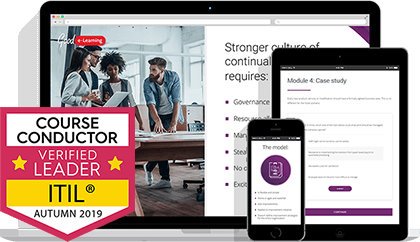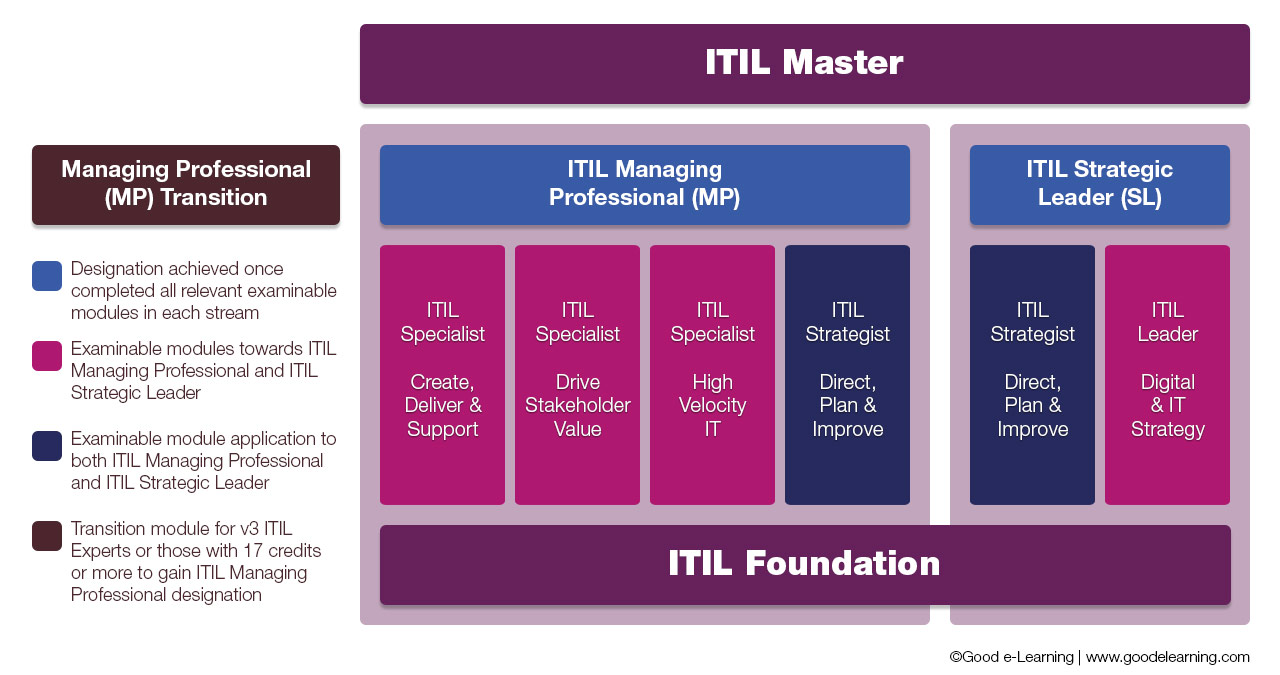


Student Review
With IT being such an integral part of modern business, factoring it into long-term planning and improvement is essential for successful organizations. ITIL DPI offers a series of terms, tools, and best practices for healthy IT governance, including methods for organizational change management and overseeing Governance, Risks & Compliance (GRC). It is ideal for organizations wishing to plan, enable, and measure long-term changes whilst also justifying them to stakeholders and firmly establishing environments of continuous learning.
Kickstart your ITIL DPI training today!
This introductory module introduces students to the course, showing them the course structure and outlining the learning outcomes.
This module looks at the key concepts and definitions of ‘Direct, Plan and Improve’. Students will learn to differentiate key terms, including ‘vision’, ‘mission’, ‘methods’, ‘operating model’ and ‘scope of control’.
The module then goes on to discuss planning management at various levels, along with the roles of governance, compliance, and management.
Finally, it discusses value, outcomes, costs, and risks, as well as how they relate to direction, planning, and improvement.
This module describes elements that are to be directed and planned and how to use key principles and methods for direction and planning.
By the end of this module, students will know how to cascade requirements and goals, as well as how to define effective policies, controls, and guidance. Students will also know how to ensure that controls are sufficient without being excessive. This will leave them with enough know-how to be able to place decision-making authority at the correct level.
This module looks at Governance, Risks, and Compliance (GRC) and the principles and methods relating to it.
By the end of the module, students will be comfortable with identifying the purpose and role of GRC, as well as integrating the principles and methods into ITIL 4’s Service Value System (SVS).
The module also describes the role of risks and risk management, as well as how governance impacts DPI.
This module examines the key principles and methods used to enable continual improvement for all types of improvements.
By the end of this module, students will know how to improve the SVS, as well as how to embed continual improvement at every level of the SVS. Students will also be familiar with assessment methods and objectives, as well as outputs, requirements, and criteria. Finally, students will know how to build, justify and advocate a business case, as well as how to conduct improvement reviews and analyze lessons learned.
This module takes students through Organizational Change Management (OCM) and how it is applied to direction, planning, and improvement.
By the end of the module, students will understand the scope, nature, and potential benefits of OCM, as well as how to establish effective interfaces across the ITIL value chain.
This module looks at measurement, as well as reasons for focusing on measurement, metrics, reports, success factors, and, most importantly, KPIs.
By the end of the module, students will have a practical understanding of how to use principles and methods of measurement and reporting in direction, planning, and improvement. They will also be able to define indicators and metrics which can be used to support organizational objectives.
This module examines the differences between value streams and practices, along with the impact these differences have on direction, planning, and improvement.
By the end of the module, students will be able to select and utilize appropriate methods and techniques to direct, plan and improve value streams and practices.
This module looks at stakeholders, communication, and feedback. Students will learn about the key principles and methods used for communication and organizational change management. They will also come to understand how and why they are essential to direction, planning, and improvement.
Finally, students will look at how to effectively influence and communicate with others, as well as how to establish effective feedback channels.
These practice exams are designed to simulate the conditions that students will face when taking the official ITIL 4 Specialist: Direct, Plan & Improve examination. It will be well worth testing your knowledge before booking your exam, as it will give you the chance to highlight and revise any modules which you have been struggling with.
When you feel you are ready to sit the ITIL DPI exam, simply contact Good e-Learning to request your FREE exam voucher.
This is a short module that sign-posts the end of the course.
This course is designed to prepare students to sit and pass the ‘ITIL Specialist: Direct, Plan & Improve’ examination. In order to sit the exam, students must satisfy one of the following criteria:
Passing the ITIL 4 DPI examination is a prerequisite for completing both the ‘Managing Professional (MP)’ and ‘Strategic Leader (SL)’ streams. However, students only have to pass the exam once.
This course comes with a FREE exam voucher
Before booking your exam, it will be a good idea to make sure that your device meets the technical requirements. You can do so via this online test. This test will examine the suitability of your webcam, microphone and internet connection. Please visit the PeopleCert website for more information and guidance.
When you are ready to use your free exam voucher, simply contact [email protected]. Exam voucher requests are typically processed within two working days, but please allow up to five. Students must request their exam voucher within the course access period which starts from the date of purchase. For more information, please visit our Support & FAQs page.
ITSM stands for ‘IT Service Management’. It involves using policies, procedures, and best practices to optimize IT services for clients and employees.
‘ITIL 4’ is the latest iteration of ITIL, the world’s leading framework for ITSM. It offers a series of best practices to help IT-powered organizations design, develop, and continually improve their IT services.
Previously, ITIL stood for the ‘Information Technology Infrastructure Library’. The framework has evolved to the point where it is updated so often that it cannot be considered a static ‘library’. Because of this, the name no longer stands for anything.
Students start with ‘ITIL Foundation’. Passing the Foundation exam then enables them to choose modules in the ‘Managing Professional’ or ‘Strategic Leader’ streams.

According to Payscale, certified ITIL practitioners can earn between $51,000 and over $259,000 (or £18,000 and over £118,000), depending on their experience, role, and certification level. Even sitting a Foundation course can have significant benefits for ITSM professionals.
ITIL provides users with a set of best practices for creating optimized IT services. It establishes cultures of continuous improvement, ensuring that users can enjoy long-term benefits with IT services continually aligned with business goals and strategies. It also offers proven practices for resource optimization and continuous improvement.
ITIL 4 is a modern framework that fully equips users to optimize their IT practices. It creates cultures of continuous improvement, enabling organizations to deliver top-quality IT products and services whilst also continually reviewing their own processes.
The framework is also highly adaptable and can work alongside other popular approaches, such as DevOps. Finally, the framework is set to continue evolving to accommodate developments in technology and best practices. This makes ITIL future-proof for practitioner organizations.
‘ITIL v4’ is ITIL 4. Previous iterations of the framework were treated as ‘versions’, resulting in names like ‘v3’. However, ITIL 4 does not follow the same format, as it will be updated on a regular basis.
There were three major changes with the release of ITIL 4. Firstly, it is more industry and community-driven, with practitioners helping to update the framework. Next, it can be easily integrated with other popular frameworks, such as DevOps, Agile, and Lean. The new framework also has an updated certification path.
AXELOS is a joint venture company behind a variety of highly popular best practice frameworks, including ITIL 4, PRINCE2, MSP, and AgileSHIFT.
ITIL 4 can be integrated with several other frameworks, including Agile, DevOps, and Lean. Some practitioners even use it alongside PRINCE2.
Drive Stakeholder Value is critical in staying viable in today’s dynamic business world. This Good e-Learning ITIL 4 course is easy to digest and interesting to go through. Start exploring your customer journey with this course and expand your own learning journey along the way!









Omniplex (Group) Ltd trading as Good e-Learning
45 Grosvenor Rd, St Albans, AL1 3AW
Company Number: 02584418
VAT Number: GB 434205135
"*" indicates required fields
"*" indicates required fields
At Good e-Learning, we’re dedicated to ensuring success. That’s why we offer Exam Pledge which entitles students to a free exam retake on any eligible course (see full list).
Resits are taken online via remote proctor. For more information about online exams, please visit our Support and FAQ pages.
As long as you have purchased a Good e-Learning course that is eligible for Exam Pledge and adhere to the conditions listed below, you will be able to request a free resit. If you fail your first exam, simply contact our support team to claim your retake voucher.
As long as you have completed the course in full and have scored at least 80% on the exam simulator, you will be eligible for Exam Pledge. Proof of date for the first exam failure must be provided and the resit must be booked within 3 months of the failed first exam. Exam Pledge is only available for courses purchased on or after 01/10/2019 and cannot be used for anyone sitting an exam for the third time. The course must be purchased directly through Good e-Learning and must have a valid order number. Please see full terms here.
"*" indicates required fields
"*" indicates required fields